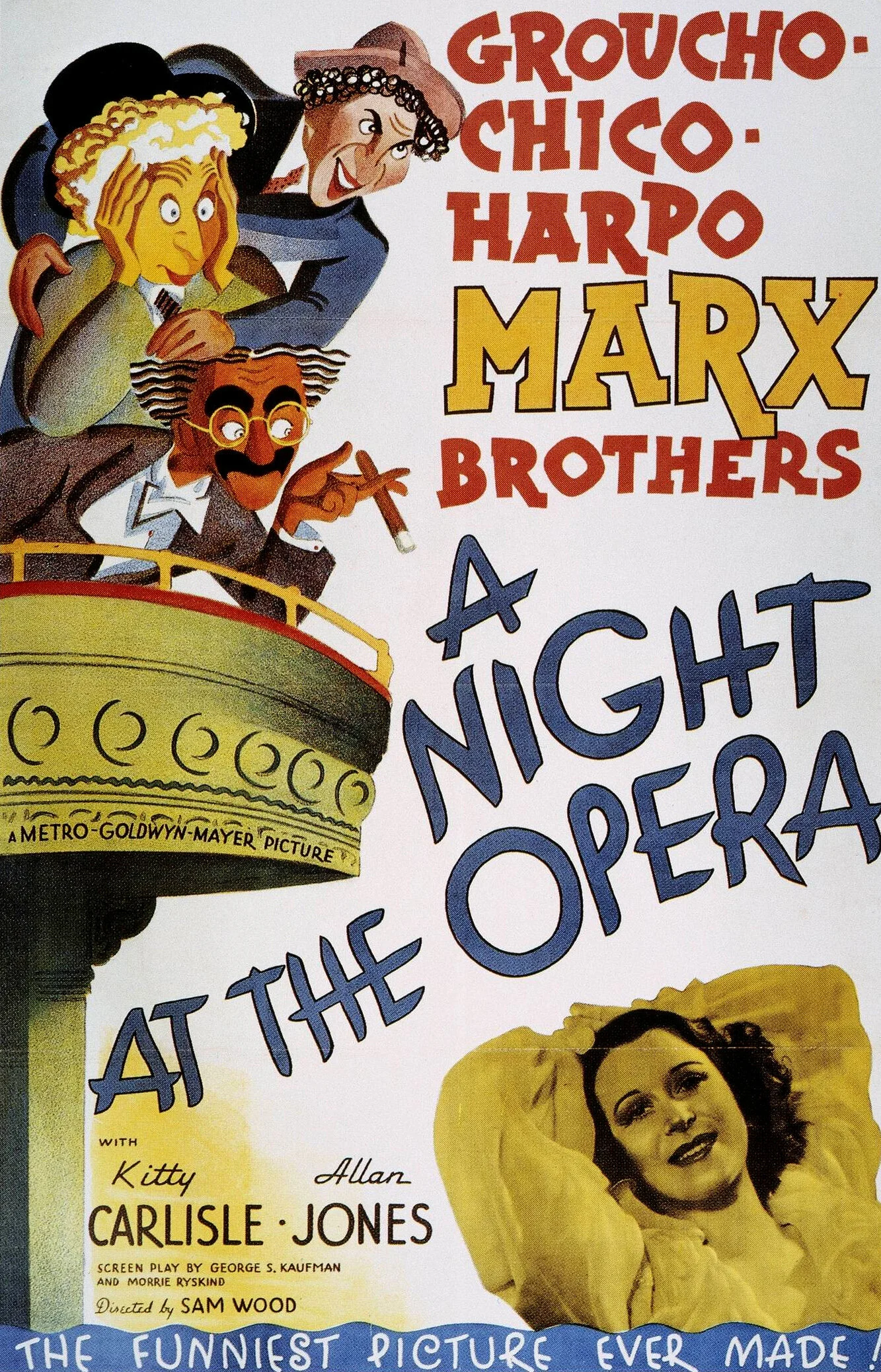A Night at the Opera (1935)
Written by George S. Kaufman & Morrie Ryskind
Directed by Sam Wood
1998 List Ranking: NA
2007 List Ranking: 85
The Brothers and frequent costar Margaret Dumont
To get right to the point, A Night at the Opera, the second of two Marx Brothers films on this list, shows a marked difference in style from their previous film, Duck Soup. Despite those differences, I still don’t think the Marx Brothers’ style of comedy is really up my alley. However, the other, new, elements of this film are more enjoyable than that previous film.
Duck Soup, from 1933, was the Brothers’ last film with Paramount; this film begins their partnership with MGM. As such, there are some changes to their style that debut here, most notably the clear toning-down of the Brothers’ methods of anarchy: whereas before, the Brothers were anarchic to literally anyone who crosses their paths, now their misdeeds are generally directed towards the villains of the story. Moreover, the characters of Chico and Harpo are made more sympathetic than their previous incarnations. Lastly, romantic subplots for other characters are added, and the Brothers’ antics are generally centered on highlighting them.
Chico and Groucho in another famous bit from the film
The biggest issue I have with this film is, again, the over-reliance on puns and quips. There are SO MANY PUNS rattled off in the film that it begins to feel exhausting. Groucho is the biggest culprit, and it gets to the point that I would inwardly groan whenever he’d enter a scene. He essentially stops the plot in its tracks in order to launch into one of his routines and I just wanted to get back to the story; I think it’s a problem when the stars of your movie are the least enjoyable parts of it.
There is also a strange editing phenomenon in which gaps for laughter are edited in, so that a certain routine takes twice as long because the Brothers have to keep stopping to allow for laughs. This is not an issue exclusive to this film, but when so much of the comedy is derived from the verbal aspects, the lack of laughter just makes the scenes feel awkward and cringeworthy. I’m not saying that I want a laugh-track (which would be worse), but that visual comedy doesn’t have to worry about laughter drowning out jokes.
The Stateroom Sequence
One great physical comedy scene in the film is the stateroom scene, a now-classic Marx Brothers routine. It’s probably familiar, at least in concept, to you, in which 15 people end up crammed inside a tiny stateroom, ending with the group spilling out into the hallway once the door is opened for the final time. The dialogue in the scene is unnecessary: aside from Groucho’s never-ending puns, the dialogue just serves to explain why someone is entering the room. The visual aspect is much more appealing, as the situation becomes more and more absurd and it was one of the few times I audibly laughed at the film.
Harpo entertaining the crowd
A scene that isn’t funny but is still wonderful is the Italian party on the deck. Chico, Harpo, and fellow stowaway Ricardo (played by Allan Jones) end up at an Italian feast where, after stuffing themselves, Ricardo regales the crowd with a song (he’s an aspiring opera star), and then Chico and Harpo entertain the children of the group with music. Jones’ song is fun and upbeat, but watching Chico and Harpo not only entertain children but also showcase their prowess on various instruments (Chico on piano, Harpo on harp) is a sweet joy. The brothers are masterful musicians, and the sequence allows them to show off their skills as well as soften their more abrasive personalities for the audience, endearing them by playing with the children, making silly faces and showing off. Say what you will about the Marx Brothers, but their talent has to be acknowledged.
It’s strange to recall that nearly 20 years ago, when I watched Animal Crackers, that I really enjoyed the Marx Brothers, but now, after watching two more of their films, I find my tastes have evolved and find them tiresome. Like many other aspects of entertainment, while I understand and appreciate their contribution to history, I find their sensibilities not to my own taste (of which there is no accounting for, after all). I think comedy fans should definitely give them a watch, but I also think there are better examples of comedy geniuses out there.
FINAL GRADE: C+






